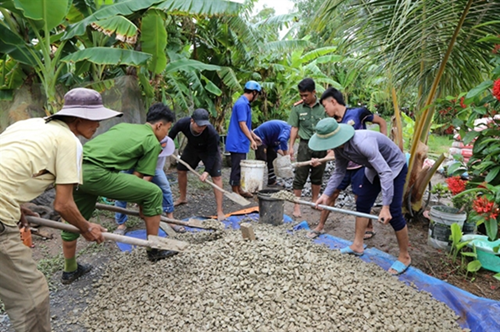Vietnam is a multi-ethnic country with 54 ethnic groups coexisting together. Among them, the Khmer community in the Southwestern region has a population of about 1.3 million people.
The Khmer are known for their strong sense of patriotism, diligence and creativity, in addition to a rich and diverse cultural heritage.
    |
 |
|
The police force and youth volunteers join the construction of charity houses for Khmer people in Soc Trang province. |
The Southern province of Soc Trang has the highest concentration of Khmer people in Vietnam, accounting for 30% of their total population. The implementation of the socialization policy for housing in the locality has achieved positive results, addressing the issue of housing for impoverished Khmer households, while solving social welfare problems and reducing poverty.
Specifically, the Vietnam Ministry of Public Security, in collaboration with the provincial authorities of Soc Trang, mobilized and provided financial support for the construction of 1,200 houses for the poor and disadvantaged in Soc Trang Province within the program The Whole Nation Joins Hands to Support the Poor - No One Left Behind.
Starting from early 2023, the program was successfully completed early this year, just in time for the Khmer New Year celebration, Chol Chnam Thmey.
According to Lam Van Man, Secretary of the Soc Trang Provincial Party Committee, the implementation of the program to support the construction of 1,200 houses for poor and disadvantaged Khmer households has been carried out in a manner that ensures the correct targeting, quality and progress.
The program has a detailed road-map, achieving high efficiency while minimizing waste and negative outcomes. The house model has been approved by relevant authorities based on a basic design, featuring a solid concrete wall and durable materials capable of withstanding rain and storms, he added.
The funding for the program was mobilized by the Vietnam Ministry of Public Security through various sponsors. It was supported by local residents and youth volunteers with transportation of construction materials to areas with difficult access.
The housing construction support program, led by the Ministry of Public Security of Vietnam in coordination with the local authorities of Soc Trang Province, is one of many programs aimed at realizing the national goals and ethnic policies of the state.
It has opened up a prosperous and abundant life for Khmer people in Soc Trang province and the region.
Changes can easily be seen in many other regions where many Khmer people reside like Tra Vinh, Kien Giang, An Giang or Bac Lieu. Roads connect every corner and every household has electric lighting. Solid and beautiful houses have replaced old and dilapidated ones. Many rural inter-commune and inter-hamlet routes, medical facilities and well-built schools have been built.
Along with the strong investment and development of essential infrastructure, local authorities in areas with significant Khmer populations have effectively implemented supportive production policies and created favorable conditions for Khmer people to access preferential loans, as well as developed sustainable agricultural economic models. They therefore have the means and motivation to develop production, increase their income and gradually stabilize their lives.
Ethnic education and training are being constantly renewed, raising the level of knowledge and improving the quality of the workforce. Many cultural and artistic activities are organized, with the active participation of not only the local people but also many tourists, such as the Ok Om Bok Festival, Ngo Boat Racing and Ox Racing Festival. The Khmer Theravada Buddhist monks and the Patriotic Monks Association have actively and unitedly operated within the framework of the Vietnam Buddhist Sangha, effectively participating in patriotic movements.
These achievements result from comprehensive guidance, policies and support from the state and government, as well as the involvement of relevant agencies and the timely engagement of local authorities.
Many policies and programs have been issued in line with the requirements for stability and development in areas where ethnic minority communities, including the Khmer people, reside. Their content has become increasingly diverse and extensive, while effectiveness has been improved.
Every year, local authorities prioritize allocating resources for socio-economic development in ethnic minority areas, with a focus on transportation and infrastructure development, poverty reduction, addressing social welfare issues, human resource development, and preserving and promoting the traditional cultural identity of ethnic communities.
Source: VNA